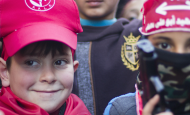Analysis of B’Tselem’s “Minors in Jeopardy” Report
Disclaimer
Because B’Tselem’s report is almost entirely derivative of previous publications by UNICEF, B’Tselem, and other NGOs, parts of this analysis are taken from the following NGO Monitor publications: “The Origins of ‘No Way to Treat a Child’: Analyzing UNICEF’s Report on Palestinian Minors,” “No Way to Represent a Child: Defense for Children International – Palestine’s Distortions of the Israeli Justice System,” “UNICEF and its NGO Working Group: Failing Children,” “Military Court Watch: Inventing Legal Standards to Attack the IDF,” “Singling Out Israel While Whitewashing Terrorism: Watchlist’s 2018 Policy Note,” and “Al Jazeera Joins the Anti-Israel Child Campaign.”
Overview
B’Tselem’s report “Minors in Jeopardy,” was funded by UNICEF and echoes the claims of Defense for Children International – Palestine (DCI-P), UNICEF, Military Court Watch (MCW), and its own 2012 and 2015 reports on the subject. This practice of “copying and pasting” and the financial support provided by UNICEF demonstrate the close coordination between Palestinian, Israeli, and international non-governmental organizations (NGOs) in a concerted effort to falsely accuse the IDF of systematically violating the rights of Palestinian minors in order to impose sanctions against Israel.
A central objective is to pressure the UN Secretary-General to blacklist the IDF by including it in the Annex to his annual report on grave violators of children’s rights, alongside terror groups like ISIS, Boko Haram, and Al-Qaeda. UNICEF and a number of NGOs, including B’Tselem, DCI-P, Palestinian Center for Human Rights, Save the Children, and Watchlist are leaders of this dimension of the campaign. DCI-P, as well as other UNICEF partners, have ties to the Popular Front for the Liberation of Palestine (PFLP) – designated as a terrorist organization by the US, EU, Canada, and Israel. The timing of B’Tselem’s report is part of annual NGO efforts in March, before the Secretary-General releases his report.
Key Points from the Report
(1) The report is funded by UNICEF.
According to the Israeli Registrar of Non-Profits, in 2017, UNICEF provided NIS 76,626 for the project “Youth in the Military Justice System.” This funding is part of a series of by UNICEF led projects in the West Bank and Gaza, including those implemented in partnership with NGOs and/or members of the Working Group.1 In turn, much of the funding originates with governments and is often designated towards humanitarian projects. While some of these projects appear to serve the humanitarian purposes for which the funding was granted, others – such as this B’Tselem report – have clear political advocacy agendas.
(2) According to footnote #9 (pg. 6), B’Tselem bases its claims on DCI-P’s 2016 “No Way to Treat a Child” report, UNICEF’s 2015 “Children in Military Detention” bulletin, a report (name/date not provided) published by Military Court Watch, and additional information collected by B’Tselem. According to B’Tselem, these combined sources of information amount to 884 “affidavits.” An affidavit is a sworn statement made before an authorized official and subject to penalties of perjury. There is no information as to whether these 884 statements are actual affidavits or B’Tselem is loosely using a legal term to bolster the credibility of claims.
There are serious methodological flaws with B’Tselem’s source material:
First, none of the individual NGOs utilizes proper statistical methodological when selecting its samples. As such, the overall sample is biased and is a non-random representation of minors that come in contact with the Israeli military justice system.
Second, no information is provided as to how the affidavits were obtained, by whom, or in what context. DCI-P, for instance, appears to have had at least one employee linked to the Popular Front for the Liberation of Palestine (PFLP) terror group involved in the data collection process at the time of the reports referenced by B’Tselem. According to DCI-P, Hashem Abu Maria “served as the coordinator of DCI-Palestine’s community mobilization unit, promoting constructive child participation throughout the Occupied Palestinian Territory” where he “focused on Palestinian teens monitoring and documenting child rights violations in Hebron” (emphasis added). In July 2014, Abu Maria was killed during a violent confrontation in Beit Ummar. Following his death, he was hailed by the PFLP as a “comrade” and a “leader,” which issued an official mourning announcement.
Third, it is likely that some of the same affidavits are included multiple times in the already biased sample. For instance, according to B’Tselem, MCW data was used for the years 2016-2017 and B’Tselem’s own data for the yeas 2016-2018. B’Tselem does not indicate whether any overlapping affidavits for the years 2016-2017 in the MCW and B’Tselem data were discarded from the total number of affidavits analyzed. Further, DCI-P is a prominent member of the UNICEF-led NGO Working Group and feeds data into the UNICEF monitoring database. UNICEF’s 2013 data, for instance, was based almost entirely on “affidavits” provided by DCI-P. This means that there is potential overlap in the data B’Tselem selects from UNICEF for 2013-2014 and DCI-P for 2012-2015.
Fourth, B’Tselem states that the NGOs it relies on use “diverse methodologies” that all “point to the same factual findings.” However, DCI-P states that it too relies on collecting affidavits (some of which may have been collected by staff members affiliated with the PFLP terror group), as does Military Court Watch.2 UNICEF states that it uses four sources of information, which includes information provided by the NGO Working Group (e.g. DCI-P and B’Tselem). In other words, these organizations regularly use and cite self-referential material, yet present it as distinct and independent sources of information.
Except for the four testimonies provided at the end of the report, without B’Tselem making each of the 884 affidavits public (the name of the minor redacted to protect confidentiality) and providing the context of these statements, including who conducted the interview, where it was held, who was present (e.g. members of terror organizations), what questions were asked, during what point in the legal process, who swore the statement, and whether official complaints were filed, this information cannot be viewed as credible.
Moreover, given the lack of information regarding the affidavits and due to the likelihood of double counting, the various percentages given throughout the report that are supposedly based on these affidavits are completely meaningless.
(3) The report contains little to no original research, and instead echoes claims made in previous iterations by B’Tselem, DCI-P, and UNICEF. NGO Monitor’s previous analysis is, therefore, relevant here too. B’Tselem makes no indication that it reviewed the case files of arrested minors to verify claims of other organizations.
Specifically, B’Tselem:
- Ignores the reality where, since the Oslo Accords, Israeli military courts only have jurisdiction over a limited number of crimes, the most severe, violent offenses committed by Palestinians in the West Bank. Therefore, it is nonsensical for B’Tselem to repeatedly evoke the concept that the “detention or imprisonment of children must be used as a measure of last resort…” The principle of last resort applies to the full spectrum of offenses (i.e. non-violent crimes like vandalism, robbery), but recognizes that severe, violent crimes may result in imprisonment. Second, this concept is related to “diversion,” meaning diverting a defendant out of the criminal justice system to more constructive frameworks. In the context of serious violent crimes like murder and attempted murder, this is a non-starter. B’Tselem does not propose alternative realistic measures that Israeli authorities could take to limit Palestinian minors’ contact with the military justice system and like DCI-P and UNICEF-oPt’s other allies, its objectives are entirely political.
- Refers to the IDF’s use of handcuffs as if this is an extraordinary practice. In fact, the use of hand restraints in law enforcement is ubiquitous around the world, in particular when arresting suspects for violent offenses such as murder.
- Refers to the IDF’s use of night arrests as if this is a violation of international law. In fact, there is no internationally recognized standard that prohibits nighttime arrests, even for minors. It is absurd to suggest that law enforcement is prohibited from arresting anyone, minor or adult, who has committed murder or other violent act solely during daytime hours. Furthermore, B’Tselem acknowledges and then completely disregards the fact that many nighttime arrests are conducted for operational purposes in order to limit disruptions to the peace and violence (pg. 23) and that due to the resources required, such operations are primarily used in exceptional cases.
- States that parents are not informed of their child’s arrest and that “soldiers never give parents the form described in the Military of Justice document.” In fact, and despite the lack of international standards on the issue of notification, IDF operational orders require that the parents of a minor arrested at home are given a form that includes the nature of the suspicion for which the minor is being arrested, the intended place of interrogation, and contact numbers. B’Tselem’s argument is further discredited as the IDF Military Prosecution even requires that operational forces and the Israeli police include a copy of this form in the investigative files. The existence in the files of these forms, often signed by the parents of the arrested minors, proves that this claim lacks any credibility. In addition, the applicable law requires that parents be notified when an investigator questions a minor. These conversations are documented at the start of the investigation. Moreover, the law requires that notification of every arrest be provided to the family of the detainee. These notifications are also documented.
- States that “minors are required to sign a document the interrogators claim contains the statements they had made during the interrogation. The document itself, however, is usually written in Hebrew so the minors do not understand it…” B’Tselem goes on to note that “some” interrogations are recorded. However, in addition to the interrogations being conducted in Arabic, when the statement of the suspect is documented in Hebrew, the interrogation must be audio or audio-visually recorded in order for an indictment to be submitted to the court. Furthermore, as noted in the testimonies provided at the end of B’Tselem’s report, according to the law, a suspect is not actually required to sign his/her statement.
- Claims that interrogators did not inform minors of their rights at the start of the interrogation. In reality, the right to consult with a lawyer has been accepted by Israel’s Supreme Court as one of the fundamental rights of a suspect and breach of this right, according to precedent, can lead to the inadmissibility of any statement given by the suspect. The language used by the Israeli Police to inform a suspect of his rights was reviewed within the past three years, amended, and approved by the Ministry of Justice to ensure that it meets the legal requirements. Additionally, the right to avoid self-incrimination (right to silence) is prescribed by law and is included in this same standard text that is used for both Israelis and Palestinians.
- Argues that minors are not released based on flaws in the interrogation, such as complaints of abuse. However, according to the former Head of the IDF Prosecution in the West Bank, the fact that military and civilian judges seldom exclude confessions of defendants is not the product of bias, as alleged by B’Tselem, but rather because such claims are rarely raised by the defendants in court.
- Argues that Israel “does not even grant parents the right to be present during their child’s interrogation.” In fact, there is no internationally recognized standard that requires parents to be present during the interrogation of minors. Furthermore, the same laws apply under Israeli civilian and military law regarding the presence of a parent during interrogation. Under Israeli law, minors who are interrogated under arrest are not entitled to have their parent present. Israeli law also does not permit lawyers to be physically present during interrogations; however, the suspect has the right to consult with counsel before being interrogated.
- Attacks the allowance for plea bargains in military courts. Firstly, the percentage of plea bargains reached in the military courts does not substantively differ from the percentage of plea bargains in the civilian justice system. It should also be noted that plea bargains do not only relate to sentencing, but rather, in many circumstances, include a waiver by the prosecution to try more serious offenses contained in the original indictment. Therefore, plea bargains, by their nature, are very beneficial for the defendant. Secondly, as noted in all four of the testimonies included in B’Tselem’s report (beginning on pg. 31), the Palestinian minors’ lawyers recommended and encouraged their clients to accept a plea bargain.
- Belittles the violent offense of stone throwing, which is acknowledged as being the most prevalent offense committed by Palestinian minors. Often, gangs of Palestinian teenagers stand at the side of roads and pound the passing cars that they identify as “Israeli cars” with stones. Stone throwing at on-coming vehicles travelling at high speed tremendously increases the kinetic force of the chosen weapon and poses a real and severe danger to drivers. The minors often cause considerable physical damage and in many instances severe injury. Stone throwing has also resulted in the death of the victims. It is bizarre that a human rights group, as B’Tselem claims to be, would minimize the act of throwing rocks at cars on a highway. It is also immoral that European governments and international institutions would fund an organization that argues such.
(4) B’Tselem argues that “The procedures that have been put in place fall far short of providing adequate protection in the first place and, in any event, are not implemented. In addition, the military courts do not release minors whose rights were violated during their arrest and interrogation.” While heavily criticizing the numerous reforms put in place to improve the juvenile military justice system, B’Tselem fails to actually describe what steps Israel could take to improve its justice system in accordance to international law. This demonstrates that B’Tselem’s goal is simply political and little to do with criminal justice.
Footnotes
- Since “Israel/State of Palestine” is discussed in the body of the Secretary-General’s annual report on Children and Armed Conflict, UNICEF heads a “Working Group,” made up of UN agencies and NGOs, to monitor and report on alleged instances of grave violations against children. For more information, see NGO Monitor’s report “UNICEF and its NGO Working Group: Failing Children.”
- For example, as mentioned, Hashem Abu Maria, who served as a DCI-P “coordinator,” focused on “monitoring and documenting child rights violations in Hebron.” Abu Maria is hailed as a “comrade” and “leader” by the PFLP. video uploaded to Youtube by DCI-P shows his memorial service decorated in PFLP garb.






